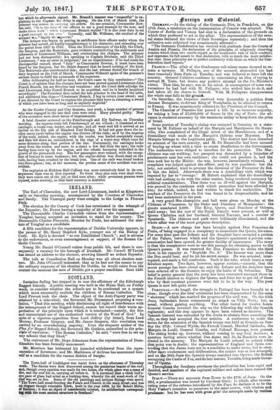SCOTLAND.
Sectarian feeling has stepped in to mar the efficiency of the Edinburgh Ragged Schools. A public meeting was held in the Music Hall, on Friday week, to consider whether the schools are to be conducted on a system which must necessarily exclude the children of Roman Catholics. The Lord Provost took the chair. The object of the Anti-Popery party was attained by a side-wind; the Reverend Mr. Drummond proposing a reso- lution, "That this mediae while disclaiming all right of interference with the management of the lagged School, cannot but record their warm ap- probation of the principle upon which it is conducted—namely, the free and unrestricted use of the authorized version of the Word of God." In spite of a vigorous opposition from Lord Jeffrey (by letter), from Lord Murray, Professor Gregory, and Mr. James Simpson, this resolution was carried by an overwhelming majority. Even the eloquent author of the Plea for Ragged Schools, the Reverend Mr. Guthrie, subscribed to the prin- ciple of exclusion: "The Roman Catholics," he said, "were free to set up any schools that they liked."
The retirement of Mr. Hope Johnstone from the representation of Dam- friesahire has been formally announced.
Mr. Morrison has intimated his intended withdrawal from the repre- sentation of Inverness; and Mr. Mathieson of Ardross has announced him- self as a candidate for the vacant district of burghs.
The Town-hall of Linlithgow was burnt down on the afternoon of Thursday week. The flames were first discovered among the ponderous beams of the roof; and, though every exertion was made for two hours, the whole place was a mass of fire, and the roof fell in, carrying all before it. It is surmised that a thick bull's- eye pane of glass had acted as a burning-lens, whereby the old wood-work of the roof was set on fire. Some of the old painting-s and antique fittings were saved. "The Town-hall stood fronting the Palace and Church in the main street; and was an elegant though venerable fabric, built in the year 1668, by Sir Robert Miller, of Barnton ; it was an object of considerable interest, its architecture correspond- ing with the most ancient structure in Scotland."


























 Previous page
Previous page